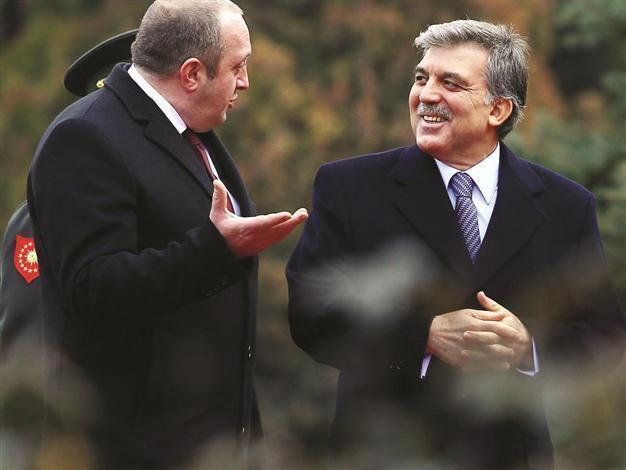Turkish President Gül hints at Parliament for ‘amending’ judiciary bill
ANKARA

Turkish President Abdullah Gül (R) and his Georgian counterpart Giorgi Margvelashvili speak during a ceremony at the Çankaya Palace in Ankara, Jan. 20. AA photo
Parliament’s divided parties can still find reconciliation on a controversial bill on the Supreme Council of Judges and Prosecutors (HSYK) on the floor of the General Assembly, according to President Abdullah Gül.
During a joint press conference with visiting Georgian President Giorgi Margvelashvili, reporters reminded Gül that following debates at the Parliament’s Justice Commission, the draft was actually sent to the General Assembly floor without any dramatic change. He was asked whether he would veto the bill if it was adopted by Parliament in its present shape.
“You know about my efforts last week,” Gül said in reference to his series of meetings with both Prime Minister Recep Tayyip Erdoğan and leaders of the three opposition parties – the main opposition Republican People’s Party (CHP), the Nationalist Movement Party (MHP) and the Peace and Democracy Party (BDP) – in a bid to defuse the row over the judiciary stemming from a damaging corruption scandal.
Parliament’s Justice Commission approved the ruling party-led set of amendments that will give the government significantly more control over the HSYK on late Jan. 16 after starting the debates on Jan. 10.
Gül met with opposition leaders Jan. 13 before meeting Erdoğan, who later announced the draft could be “frozen” if the parties agreed on a charter amendment.
“I have strived for a constitutional amendment. Actually, the main goal here is not only to resolve an issue, which we discussed within the framework of the judiciary, through the Constitution, but I was also attributing great importance to showing that an issue can be resolved through the cooperation of the government and the opposition when there is turmoil in Turkey. That would be [phenomenal], but unfortunately, it hasn’t happened as far as I can see,” Gül said.
“Now, one needs to look at how the law will be adopted. There are still opportunities at the General Assembly for some changes. Let the law be adopted first, then we will see what I will do,” he said.
Meanwhile, Parliament’s Constitution Commission gathered Jan. 20 to debate the draft envisioning the restructuring of the HSYK following a call from nine of its members.
Over the weekend, Foreign Minister Ahmet Davutoğlu said the government was ready to discuss every issue with the European Union during high-profile talks this week, including the row over judicial independence.
The controversy over Erdoğan’s bid to increase his control over Turkey’s top judicial oversight body has dealt a new blow to the country’s long-held goal of EU membership, just as Erdoğan was preparing for a crunch day of talks in Brussels on Jan. 21.
